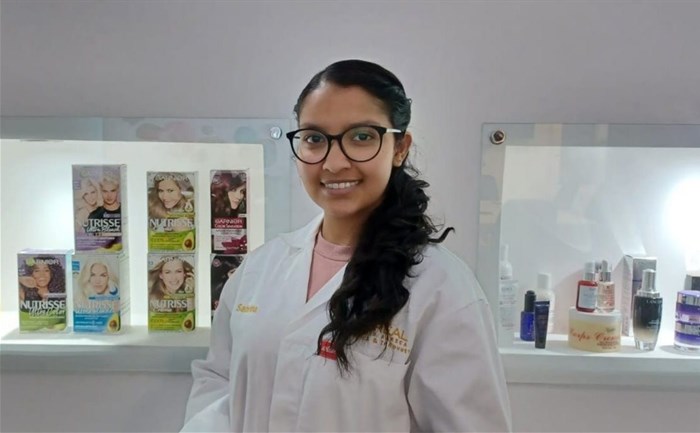Driven by a passion for green chemistry, Sabrina Khoosal is pioneering environmentally conscious products in the beauty industry as a hair development scientist in the research and innovation department at L'Oréal South Africa. She is able to channel her love for the environment through her daily work at L'Oréal, as well as through her partnership with the water remediation company, Pimeco.

Sabrina Khoosal, hair development scientist in the research and innovation department at L’Oréal South Africa
Drawn to a career in science from an early age, Khoosal recently graduated with her Masters in Environmental Analytical Chemistry, and is currently pursuing a Society of Cosmetic Chemists South Africa (CosChem) diploma.
Khoosal has been with L’Oreal for just over two years, having started as an intern in 2021 and subsequently being promoted to her current position in July last year. When she’s in the lab, she’s involved in all aspects of product formulation, including quality, safety and performance. As a project leader, she also manages the various stakeholders and processes needed to take a project from marketing brief to launch.
As part of Bizcommunity's Women's Month feature, we chat to Khoosal about green chemistry, women in science and their role in developing a sustainable beauty industry.
What is green chemistry and why do we need more women in this field?
Green chemistry refers to the design, development, and implementation of chemical processes and products that minimise the use and generation of hazardous substances. It focuses on creating sustainable and environmentally friendly solutions throughout the entire lifecycle of a product. By prioritising principles such as waste reduction, energy efficiency, and the use of renewable resources, green chemistry aims to promote the well-being of both people and the planet, ensuring a more sustainable future for the beauty industry and beyond.
The world needs scientists because everything is science and we encounter science every day. We need scientists to ask important questions which allow us to solve the problems of tomorrow, today. Female scientists are needed for their unique perspective and representation in the field to inspire future female scientists.
How should we be encouraging young women to pursue careers in sciences?
We can encourage young women to pursue careers in science by starting early, providing role models, breaking down stereotypes, creating a supportive environment, and offering opportunities for hands-on learning. We can also provide access to female mentors and role models, highlight the diversity of careers in science, encourage girls to take STEM classes and participate in STEM activities, and change the way that science is taught. By taking these steps, we can help to create a more gender-balanced future for science. This will help to ensure that the future of science is bright and that women are well-represented in all areas of scientific research.
What are some of the challenges you've faced as a woman in chemistry and how did you overcome them?
As a cosmetic formulator and scientist in the beauty industry, I face various challenges. These include evolving consumer expectations, ingredient safety and efficacy, sustainability concerns, technological advancements, and regulatory compliance.
To overcome these challenges, I keep up to date with market research, scientific findings, collaborate with experts, and ensure compliance with regulations by frequently meeting with internal regulatory stakeholders. By staying connected with consumers, adopting sustainable practices, exploring new technologies, and adhering to safety standards, I strive to develop innovative and responsible cosmetic formulations that meet consumer demands and align with industry regulations.
What special skills or qualities do believe women bring to the lab that a male counterpart may not?
Women bring a unique set of skills and qualities to the lab, including attention to detail, communication skills, problem-solving skills, teamwork and resilience. These skills and qualities make women valuable members of the scientific community and essential for ensuring that scientific research is conducted safely, accurately, and effectively.
In addition to these skills, women also bring a unique perspective to the lab. This is because they have different experiences and backgrounds than men. This can lead to new insights and solutions that would not have been possible otherwise. I believe that it is important to celebrate the contributions of women in science. They are making a difference in the world, and their work is essential for the future of science.
Why should women be environmentally conscious when buying cosmetics and beauty products, and how do we achieve that?
It’s important for everyone to be more environmentally conscious in all the choices they make to protect the environment for future generations. Our planet is facing a number of environmental challenges, such as climate change, pollution, and deforestation. If we don't take steps to protect the environment now, these challenges will only get worse in the future.
The beauty industry has a significant environmental impact and we at L'Oréal hold ourselves to the highest standards as a global beauty giant in the spotlight. We have challenged ourselves with our ambitious sustainability programme, “L’Oréal for the future”, aimed to be reached by 2030. This programme involves transforming our company towards an increasingly sustainable business model and contributing to solving the challenges facing the world, which we believe is the epitome of corporate responsibility.
The future of the beauty industry holds exciting possibilities in terms of sustainability and environmental consciousness. As consumers become more aware of the environmental impact of their choices, there is a growing demand for eco-friendly and sustainable beauty products with transparent ingredient labels. We can expect to see a shift towards packaging innovations using recyclable materials, sourcing practices that prioritise sustainable and ethically-sourced ingredients, and formulations that are biodegradable and gentle on the environment.
Additionally, advancements in technology will enable the development of more efficient production processes and alternative ingredients that minimise the industry's ecological footprint. As a cosmetic formulator, I am committed to driving this positive change by constantly exploring sustainable alternatives, collaborating with teams connected to suppliers who share our values, and working towards creating beauty products that harmonise with nature and contribute to a more sustainable future.







































